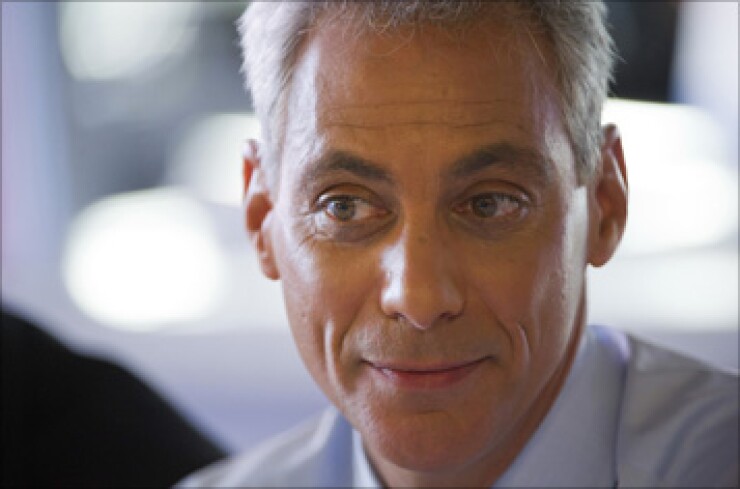
CHICAGO - Illinois Gov. Pat Quinn signed into law pension reforms aimed at stabilizing the Chicago Park District's faltering retirement system, as other local governments including Chicago continue to hope for similar legislation.
The park district legislation surfaced in November during the General Assembly's annual veto session as pressure mounted on lawmakers to overhaul the state's funds. Lawmakers adjourned without taking state level reforms but they did approve the park district plan and ended up passing state reforms during a special December session.
Chicago, its other sister agencies, and other local governments, many of which are straining under mounting unfunded pension obligations, want lawmakers to tackle reforms to address their challenges this year.
Some believe the park district changes could serve as a framework for the city's four funds and other governments and agencies. The city is carrying more $19 billion of unfunded liabilities and faces a $600 million spike in its annual payments in 2015. The city, park district, and school system were all slapped with rating downgrades last year primarily over their pension woes.
"This new law reflects what is needed -- a balanced approach of reform and revenue that gives employees, retirees, and taxpayers the security and certainty they deserve, but that has long been missing," Chicago Mayor Rahm Emanuel, who appoints park district board members, said in a statement.
The park district assembled the plan with the city's help after negotiations with the pension fund and impacted workers. It puts the district's fund on course to reach a 90% funded ratio by 2049 and full funding by 2054. The district closed out 2012 with unfunded liabilities of $550 million for a funded ratio of 43.4%.
Under the plan, the retirement age for some employees would rise, pensionable salary would be limited, and employee contributions would rise to 12% from 9% of salaries by 2019 until a 90% funded ratio is achieved, when the contribution would drop to 10.5%.
Cost-of-living increases would shift for retirees who now receive non-compounded annual increases of 3% to the lesser of 3 % or one-half the rate of inflation. The annual increase would be suspended in 2015, 2017, and 2019.
The district would phase in a hike in its contribution levels from 1.1 times employee contributions to 1.7 in 2015 and continuing upward to 2.9 times in 2019 with that level remaining in place until the fund is 90% funded. The district would also make supplemental payments between 2015 and 2019. If CPD does not make its scheduled contributions, the fund can ask the courts to compel it to comply.
The district was hit with multi-notch downgrades from Moody's Investors Service and Fitch Ratings over the summer ahead of a bond sale. Fitch dropped the district to AA from AAA and assigned a negative outlook, and Moody's lowered it to A1 from Aa2 and assigned a negative outlook. The district has $428 million of GO limited tax debt and $448 million of GO unlimited tax debt.
"The funding level of the district's pension plan has rapidly deteriorated and will reach 0% in under 10 years if current statutory underfunding of the actuarially required contribution continues," Fitch wrote.
The reform plan will help stabilize the system but it does pose funding challenges for the district, according to a local government watchdog group.
The Civic Federation of Chicago in a report late last year endorsed the district's fiscal 2014 $426 million budget and praised the district for bringing a plan to the General Assembly.
"We applaud the Chicago Park District for thoughtfully combining expenditure reductions, moderate revenue increases and comprehensive pension reform in a balanced approach to stabilizing the district's finances," said federation president Laurence Msall. "The district should protect the progress made in recent years by developing and publicizing a formal long-term financial plan."
While saying the budget lays the groundwork for enacting the reforms, the federation also warned that the changes do pose "significant budgetary challenges as a result of increased employer contributions" to the district's pension fund.
The district has been setting aside reserves to cover a $25 million supplemental payment which is due in two installments in fiscal 2015 and 2017. The district has yet to settle on a plan to cover a $50 million supplemental contribution in 2019 but has said it could use short-term borrowing and reserves to make the payment.
"The federation is open to the transparent and sparing use of short-term borrowing to fund the District's supplemental pension contribution since the debt costs would be balanced with sustainable reforms that include reductions to benefits that will lower costs over the long-term," the report said.
The federation also recommended that the district pursue further reforms including shifting employer contributions to an actuarially required level and explore consolidating with the Illinois Municipal Retirement Fund.
The pension legislation was not endorsed by all district unions and could face a challenge on grounds it violates the state constitution which grants contractual rights to pension benefits and protects them from being diminished or impaired. Three lawsuits have been filed so far over the state pension overhaul lawmakers approved in December.





